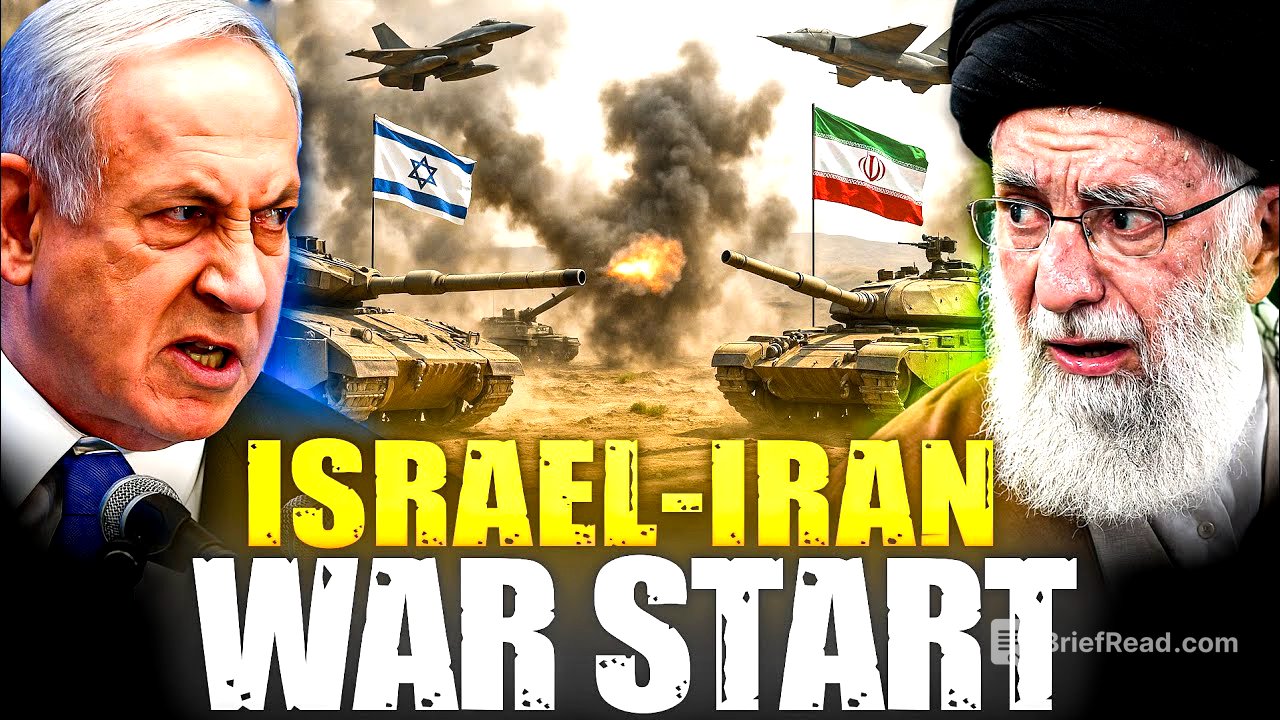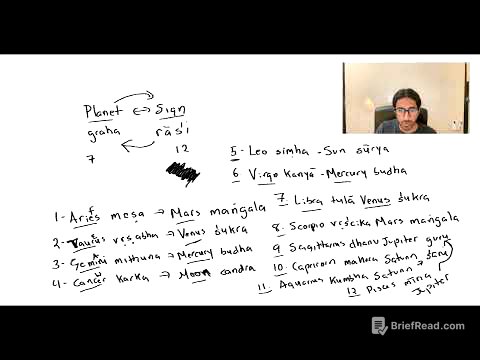TLDR;
This video discusses the escalating tensions between Israel and Iran, focusing on Israel's recent strikes on Iranian nuclear facilities and the potential implications for the region and the world. It also examines the historical context of the conflict, the role of the United States, and the potential involvement of Pakistan.
- Israel has carried out strikes on Iran's nuclear facilities, killing top commanders and scientists.
- The US is trying to distance itself from the conflict, but may use Pakistan's air bases to attack Iran.
- A fierce fight is expected between Israel and Iran, which could lead to migration, inflation, and a crisis for India.
Channel's Re-launch and Appeal for Support [0:00]
The channel "World Affairs Insights" is back after a week-long suspension due to reports, allegedly from the "0.5 Front," targeting videos about Pakistani, Bangladeshi, or similar groups in India. The host urges viewers to promote the channel to counteract potential limitations in its natural reach. He also suggests subscribing to their other channels, "Political Affairs Insights" and "Zindagi Affairs Insights," as backup options. Additionally, he mentions their presence on Instagram and Facebook under the name "Ankit Dubey ji" to maintain connectivity despite potential disruptions.
Israel's Strikes on Iran and Their Rationale [1:55]
Israel has launched a series of strikes on Iranian nuclear facilities, targeting top commanders, army personnel, and individuals associated with Iran's nuclear program. These attacks aim to dismantle Iran's nuclear weapons program, with Israel claiming to have destroyed multiple sites involved in uranium enrichment. Israel justifies these actions as preemptive strikes necessary for its survival, as it perceives Iran's potential acquisition of nuclear weapons as an existential threat, given Iran's historical animosity towards Israel and its desire to become the leading power in the Muslim world, competing with Saudi Arabia and Turkey.
Historical Context: Iran's Nuclear Ambitions and US Involvement [6:15]
Following its Islamization in 1979, Iran aimed to spread its revolutionary ideology, leading to a decade-long war with Iraq, provoked by the US. Despite initial attempts to establish relations, Iran's refusal to cooperate with the US, particularly regarding oil supplies, led the US to instigate conflict and exploit regional resources. Since 1989, after gaining some relief from the war, Iran has been determined to develop nuclear weapons for self-protection against perceived threats, especially from the US. The US has consistently worked to thwart Iran's nuclear program, sometimes with Israel's help, gathering intelligence through the Mossad and CIA.
The US, Gas Reserves, and the JCPOA [8:31]
The discovery of significant gas reserves in Iran, Iraq, Syria, and Lebanon heightened US interest, viewing gas as the future fuel source. The US aimed to control Iran's gas reserves to bolster its economy and global influence. To address Iran's nuclear ambitions, the US, under Obama, initiated the Joint Comprehensive Plan of Action (JCPOA) in 2015 with Iran and the P5+1 nations (US, Russia, China, France, UK, and Germany). The agreement allowed inspections of Iranian nuclear sites in exchange for assistance in advancing its nuclear program for electricity generation.
Trump's Sanctions and Continued Israeli Actions [11:12]
In 2016, Donald Trump became President and promptly imposed sanctions on Iran, rejecting the JCPOA and halting all nuclear programs. The US, through the CIA and Israeli Mossad, resumed intelligence gathering and targeted Iran's nuclear programs. Key figures like Qasim Soleimani and Mohsin Fakirzade were targeted, with Fakirzade assassinated in 2020 using an AI-enabled, remote-controlled gun smuggled into Iran by Mossad. Additionally, reports surfaced in 2020 of Israeli attacks on Iranian nuclear sites, though unconfirmed at the time.
Recent Escalation and Targeted Strikes [14:57]
In recent times, tensions have escalated as Iran accelerated its nuclear program, enriching uranium to nearly 90%. Israel launched attacks on Iranian military bases, nuclear scientist locations, and nuclear pump facilities. Key Iranian figures, including Hussain Salami, Ali Sham Khani, and Mohammad Bagheri, were reportedly killed in these strikes. Despite Iran's claims of readiness, its commander, General Hussein Salami, was among the first targeted in the recent attacks.
Donald Trump's Patterns and US Response [17:25]
Donald Trump's actions exhibit two patterns: reversing decisions and hinting at events before they occur. Before the recent strikes, Trump announced the withdrawal of US personnel from the Middle East, signaling impending regional tensions. Following the strikes, the US distanced itself, allowing Iran to act freely as long as US facilities are not targeted. This stance suggests a potential upheaval, given Trump's history of acting contrary to his statements.
Pakistan's Role and Operation Sindoor [22:07]
Pakistan, valued by the US for its strategic location, may offer its air bases for potential US attacks on Iran. The US previously intervened to save Pakistan from India and has shown favor through IMF loans and inviting Asim Munir to a US Army Day event. However, the US's support is contingent on Pakistan's usefulness, with Balochistan potentially being used to target Iran if Pakistan becomes obsolete. The US's actions towards Pakistan are linked to "Operation Sindoor," highlighting the complex dynamics in the region.
Future Implications and Potential Outcomes [24:37]
A fierce conflict between Israel and Iran is anticipated, potentially leading to the destruction of Iran's nuclear facilities. Increased attacks may trigger significant migration from the Middle East, affecting inflation and India-Iran relations. India faces a challenging diplomatic situation, while the US's embrace of Pakistan signals displeasure over India's defense acquisitions. The US aims to profit from the conflict by supplying weapons to Israel, while the future remains uncertain.

![16년차 앱등이가 갤럭시로 넘어가려는 이유 [갤럭시 Z 폴드7 리뷰]](https://wm-img.halpindev.com/p-briefread_c-10_b-10/urlb/aHR0cDovL2ltZy55b3V0dWJlLmNvbS92aS9hQmRCcmVuNFRpZy9ocWRlZmF1bHQuanBn.jpg)







